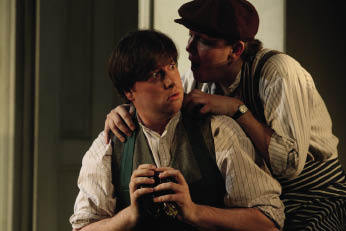Albert Herring
Royal Academy of Music
La bohème
The Cock Tavern, Kilburn
Whenever there is a new production of Britten’s great comedy Albert Herring I go to it and then carry on at some length about how wonderful the opera is, and this particular production, whichever it may be. And it is always true. For several obvious reasons, Herring is an opera that producers mess around with very little — mild and harmless updatings are just about all that it is subject to; and, though it would be catastrophic to impose a radically new interpretation on it, it would be no worse than what is visited on many other stage works which should be just as directorially unmolested. The Royal Academy of Music has been very lucky to get John Copley to stage its production, which has alternating casts, of which unfortunately I was able to see only the first. The set is less detailed than, say, Glyndebourne’s, but all necessary props are present, including Sid’s bike — odd how someone cycling on to a stage invariably raises a laugh. And of course it has a young cast, this one uniformly excellent, and not inclined to overdo the semi-parody of East Anglian manners.
What always gives me a surprise is the prodigal, Mozartian inventiveness of this score. Britten’s later operas, most of his later works in any genre, are notable and celebrated for their economy, for the composer’s capacity to build large structures out of very little basic material. That is all very well, but is there anything wrong with having lots of material, especially if it’s on a high level of inspiration, and sometimes elaborating it, sometimes teasingly letting it go, so that one never hears it again until the next time one hears the whole work? Britten’s veneration of Verdi, as well as of Mozart, might surely have led him to emulate those masters in their prodigality? I would argue that up to Herring, and culminating there, they were his models, but that afterwards he decided, for various reasons (one probably being the desire to create a claustrophobic atmosphere), to be as stingy as possible with the material out of which he made his larger works, Owen Wingrave being the terminus of that line.
Herring is great above all because it is a celebration of freedom from social oppression, particularly the kind that comes from having a hyper-possessive Mum (one wonders what poor Mr Herring was like, and what he died of). She tends, in the face of fairly strong competition, to be the most unappealing character, but it is one of the strengths of Copley’s production that she gets considerable sympathy when she is sure that Albert’s midnight spree has been suicidal, and even on his return, when she, like the rest, is only too happy to have him back to persecute. Emma Rothman performed the role beautifully, so that Albert’s incipient rebelliousness in Act I, and his superbly brutal dismissiveness at the end — ‘That’ll do, Mum’ — had one’s sympathies somewhat spread.
Albert is a gift to any reasonably equipped young tenor, and Thomas Hobbs is marvellously gormless in the first two acts, though also quite sullen, and undergoes a wholly plausible transformation thanks to the rum-based magic potion. For once it’s easy to see that Albert has learnt a lot from Mum. Sid and Nancy, Britten’s happy portrayal of happy young lovers, make one sad that he never felt inclined to develop his gifts in that direction. In fact, the whole opera marks a lonely point in his evolution, one in which the world could be seen as containing the possibility of innocence without being boring; and in that he was immeasurably helped by Eric Crozier, whose best libretto this is, by far. Nicholas Kok is the conductor of this often complex score, and gives the lovely lengthy interludes plenty of time to reveal their richness.
It’s great news that OperaUpClose’s La bohème, which has been running to packed houses in The Cock Tavern in Kilburn since early December, is to transfer to the Soho Theatre in July. It has been an astonishing success, and when I revisited it last week was even fuller than the first time — some of the audience now sit on the stage. The cast I saw was, as it happened, largely the same as the first time (there are several), and it was satisfying to see how much more they now play to one another. I still wish that they would avoid ear-splitting intimacies, and for that matter ear-splitting horseplay, in Act I. But that apart, this is as affecting and delightful a Bohème as you will see, and the smallness of the venue is crucial to its success. To be physically as close to Rodolfo and Mimi in their brief happiness and their less brief misery and agony is a telling reminder of what one is bound to be missing in any of the world’s great big opera houses, however wonderful their casts and amazing their productions. It wouldn’t work for everything, but I can think of many operas that I would love to see under comparable conditions. I hope OperaUpClose will give us the chance.





Comments